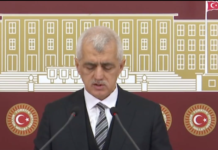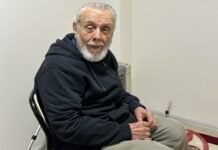Ankara’s 1st Penal Court of Peace has rejected the appeal of Zabit Kişi, 48, whose request for an investigation into his allegations of torture was previously denied by the Ankara Chief Public Prosecutor’s Office, according to a letter shared by opposition lawmaker and human rights defender Ömer Faruk Gergerlioğlu on Twitter.
Peoples’ Democratic Party (HDP) deputy Gergerlioğlu shared Kişi’s letter on Wednesday. “An inmate named Zabit Kişi, who was horribly tortured for 108 days, tells how he encountered difficulties in his efforts to find justice,” he said.
İşkencenin çok konuşulduğu bugünlerde 108 gün boyunca korkunç bir işkence gören Zabit Kişi isimli mahpus, başvurularının nasıl yokuşa sürüldüğünü anlatmış.@Akparti hala '" İşkenceye sıfır tolerans" palavrası atmaya devam etsin!!!@adalet_bakanlik @abdulhamitgul pic.twitter.com/pIQ1FJuoQ7
— Ömer Faruk Gergerlioğlu (@gergerliogluof) November 10, 2021
In his letter Kişi shared a chronology of the legal process after he petitioned the prosecutor’s office on April 5, 2018, asking them to launch an investigation into his torture allegations. He only received an answer two-and-a-half years later, on November 17, 2020. The prosecutor’s office decided that there was no need to pursue his case without even bothering to hear his testimony.
Kişi appealed the decision 13 days later. Ankara’s 1st Penal Court of Peace communicated its decision to reject Kişi’s appeal almost a year later, on October 1, 2021.
Kişi, a teacher, moved his family to Kyrgyzstan with the hope of landing a job after he became unemployed in Turkey in December 2015. The private school he had been working for was closed after a government crackdown on schools run by businesspeople close to the Gülen movement.
Turkish President Recep Tayyip Erdoğan has been targeting followers of the Gülen movement since the corruption investigations of December 17-25, 2013, which implicated then-Prime Minister Erdoğan, his family members and his inner circle.
Dismissing the investigations as a Gülenist coup and conspiracy against his government, Erdoğan designated the movement as a terrorist organization and began to target its members. Erdoğan intensified the crackdown on the movement following a coup attempt on July 15, 2016 that he accused Gülen of masterminding. Gülen and the movement strongly deny involvement in the abortive putsch or any terrorist activity.
In his absence the authorities issued an arrest warrant for him, based on allegations that he was linked to alleged putschist admirals at the Gölcük Naval Command. It became obvious during cross-examination in court that the allegations were baseless and that neither of the admirals knew him nor did he know the admirals.
Kişi’s ordeal started when he was detained in Kazakhstan for immigration irregularities when he traveled from Bishkek to Almaty. The Kazakh court ordered him to return to Kyrgyzstan, where had had a family and maintained a residence. On September 30, 2017, he went to the airport with his lawyer for deportation procedures in Almaty and started waiting for his flight to Bishkek. During the security check, his lawyer was told he could not accompany him.
He was detained again at the airport and confined to a room. He overheard airport officials talking about a plane from Turkey that would be landing soon to pick him up. A National Intelligence Organization (MİT) team forcibly removed him from the terminal and put him on a plane he described as painted with a camouflage pattern.
A minivan picked him up after landing at the airport in Ankara, and he was driven to what he described as a freight container where he was subjected to torture and abuse for more than three months. The three-square-meter container had no window, and he could barely move around. “It was like a grave to me,” he recalled. “My only escape from there was my death. I never imagined death could seem so pleasant.”
The MIT officers stripped him naked, slammed him against the wall, attempted to sodomize him with a hard object, electrocuted and crushed his toes and threatened to kill him. He had no access to legal representation or any other contact with the outside world.
Kişi turned up in an Ankara court on January 18, 2018, having drastically lost weight and claiming he was tortured. He was later sentenced to 13 years, six months in prison on terrorism-related charges.
Testifying at the Kocaeli 5th High Criminal Court on April 3, 2018, Kişi told the judges how he was beaten on the plane during the three-hour flight from Almaty to Ankara after his abduction. According to his account, the agents started hitting him in the head and genitals while he was blindfolded and handcuffed from behind. He passed out from the blows he received to his head, but the abuse continued after a member of the MİT team checked to make sure he still had a pulse.
Since the coup attempt in July 2016 the Erdoğan government has employed extralegal methods to secure the return of its critics after its official extradition requests have been denied. The government’s campaign has mostly relied on renditions, in which the government and its intelligence agency MİT persuade the relevant states to hand over individuals without due process, using various methods. The victims have faced a number of human rights violations including arbitrary arrests, house raids, torture and ill-treatment during these operations. A detailed account of the Erdoğan government’s transnational repression can be found in SCF’s latest report, “Turkey’s Transnational Repression: Abduction, Rendition and Forcible Return of Erdoğan Critics.”
In several of these cases the UN Working Group on Arbitrary Detention (WGAD) concluded that the arrest, detention and forced transfer to Turkey of Turkish nationals were arbitrary and in violation of international human rights norms and standards.















